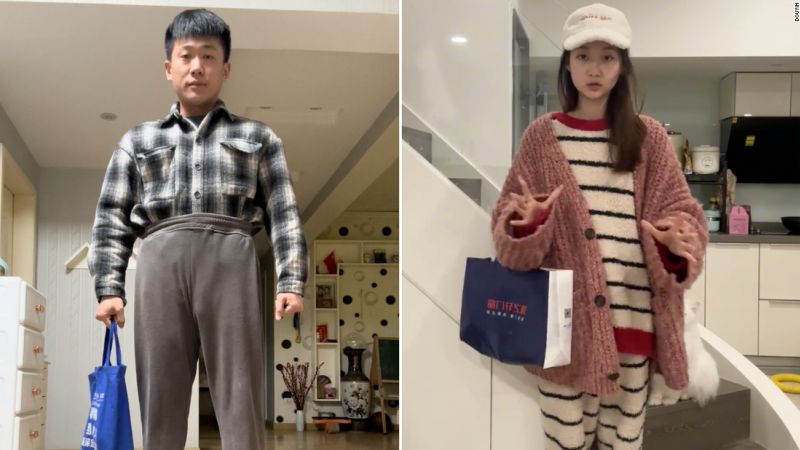CNN
—
There’s a new kind of “get ready with me” video trending in mainland China — one of “gross” work outfits.
China’s youth are donning their worst pajama bottoms, hairiest slippers and heading to the office in a tongue-in-cheek rebellion against everything from bad bosses and poor work conditions to low pay and long hours. And they’re gleefully showing off their creations online.
For months, Chinese social media users have posted under hashtags like #grossoutfitforwork #uglyclothesshouldbeforwork #ootd (outfit of the day) and are asking others to share their own takes, unleashing a competition of who wore it worst.
The hashtag “grossoutfitforwork” has attracted more than 140 million views and tens of thousands of discussions on Chinese social media platform Weibo alone. In late February, a post by Douyin (China’s version of TikTok) user , claiming she was chastised by her boss about her “gross” outfits which said she wore to battle the cold weather, went viral.
In a follow-up video, liked 752,000 times and reposted over 1.4 million times, Kendou S shows off one of her offending outfits — revealing layer after layer of mismatched pieces — a fluffy white hat, gray balaclava, tatty red gloves, puffer coat, pink quilted jacket, fleece sweater dress, plaid pajama bottoms, fur-lined slippers and knee-high socks.

In response to similar posts, one woman who posted a picture of herself in a neon yellow vest and baggy knee-length shorts wrote: “My coworker says I dress like a wild man,” while another commenter showing off a dirty yellow and blue jacket said: “My boss gave me 50 yuan (about 7 dollars) to wash my clothes and I was forbidden to shake hands with clients ever again.”
“Earning such little salary, with ugly coworkers, what else do you expect from my outfit?” read yet another post.
After embracing “tang ping” or a philosophy that rejects the rat race and consumerism in favor of a less stressful life, young Chinese people have thrown and are even paid to become “Gross outfits” appear to be the latest attempt by some disenchanted Gen Z to make a statement as the country sees and youth unemployment rates.
Young people in China are graduating into a tough job market, with the government reporting in January that the jobless rate in December 2023 stood at 14.9% among 16- to 24-year-olds. This figure, which was published after a five-month hiatus, excluded 62 million full-time students. The figure had previously hit a high of 21.3% in June.
“They’re kind of like, why bother when your work and future life prospect is not looking that bright,” said Bohan Qiu, the 29-year-old founder of the Boh Project, a Shanghai and Seoul based creative, public relations and brand consultancy for fashion brands and more. “Before they saw (working) as chasing a dream…and (companies) motivated everyone to fight for the (economic) pie. Now people are like: ‘No that doesn’t exist, or it could be a lie,’” said Qiu.

While the examples that have gone viral on social media are more extreme, Qiu said he believes casual dressing for work has always been popular in China and will continue. This, he said, will especially be the case at workplaces where overtime and long hours in front of a computer are the norm, and also with a younger generation who became accustomed to working remotely during the pandemic.
Qiu added that while his staff don’t dress the way the people in the viral videos do, they do tend to dress down. Workers have been known to come in wearing sweatpants, shorts, slippers and the like, he said, and it’s been accepted “as long as they looked cool.”
Even those posting their ugly outfits on social media don’t have a problem with looking good — outside the workplace. Many have posted that they just prefer the “banwei” or “stench of work” not be on their favorite clothes.
And while China’s state-run media were the trend of “lying flat” or “letting it rot,” called the phenomenon of dressing ugly at work a kind of “self-deprecation” and said as long as employees “dress appropriately, have a correct work attitude, do not affect other people, and do not involve issues of principle,” there’s no problem.
Qiu who works in the fashion industry also finds himself dressing down after moving to Shanghai. He said many of the smart suits he wore in Hong Kong are now languishing deep in his closet.
And as temperatures rise, some have started to share their gross outfits for the spring.
One Douyin user of a particularly egregious combo: grubby mustard toe socks and broken black sandals with gaudy plastic baubles.

